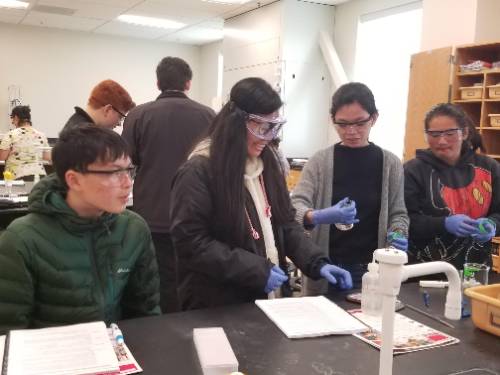Chemistry
Apply NowChemistry at Skyline College
Students enrolled in the Chemistry Program at Skyline College will learn proper scientific reporting techniques and use chemical experimentation to test hypotheses and analyze results. The Chemistry department offers a wide range of courses that fulfill General Education requirements for a variety of majors.
Employment Statistics
Average Salary in California
Jobs Growth Rate over 10 Years*
Chemists and Material Scientists
Sources: U.S. Department of Labor
Looking for a list of classes offered this semester?
Check out the current class schedule.The Field
Chemistry is the study of matter, its properties and how different substances interact with energy and with each other.
The Chemistry Program at Skyline College
To succeed in Chemistry, students will need to display a keen intellectual curiosity that pushes them to ask questions and seek answers about the substances that make up the world around us. Students should have strong critical thinking and analytical skills along with the ability to work independently and as part of a team.
While Skyline College does not offer an Associate Degree in Chemistry specifically, students can earn a degree in Natural Science that can help you create a clear path for transfer to a four-year institution.
Career Outlook
The applications for a degree in Natural Science include a variety of careers in the sciences in both private and public industry. Many jobs in Natural Science and Chemistry require a Ph.D., so the program at Skyline College is a good launching point for pursing education at a four-year university. Jobs in chemistry fields include biochemists, chemical engineers, chemical technicians, environmental scientists, geoscientists,materials engineers, and more.
Chemists spend much of their time working in offices and conducting research in laboratories. Most chemists work full time. According to the U.S. Department of Labor, chemists in California make an average of $85,930 per year.
The Skyline College STEM Center brings together academic and student support services for students taking science, technology, engineering and math courses.
The center supports student success by ensuring students have access to resources such as academic tutoring, counseling services, a resource depository for STEM pathways and transfer, a hub for internships and work based learning opportunities, as well as a place where students and staff can collaborate and build a community and supportive connection.
Check out the STEM CenterUpon completion of the program students will be able to:
General Education
- Demonstrate the ability to report scientific information appropriately and effectively.
- Critically analyze and raise questions about product claims.
- Carry out a chemical experiment to test hypothesis and critically analyze the results.
- Be ethically responsible by applying basic chemical knowledge to safely use and dispose of household chemicals.
Majors
- Demonstrate the ability to report scientific information appropriately and effectively.
- Utilizes the scientific method to analyze and interpret data.
- Demonstrate critical thinking through the discussion section of written lab reports.
- Use appropriate computer programs and instrumentation to explore chemistry.
Allied Health Chemistry
- Demonstrate the ability to report scientific information appropriately and effectively.
- Utilizes the scientific method to analyze and interpret data.
- Use the periodic table and other reference sources to gather information needed to solve chemical problems.
- Identify functional groups or reaction types and understand the role of biologically important molecules (carbohydrates, lipids, proteins, and nucleic acids) in the body.
Chem Jam is a FREE one-week intensive, fun and stimulating chemistry preparation program designed to:
- Prepare students for their upcoming Chemistry course
- Build confidence in areas such as unit conversion, reaction stochiometry
- Introduce students to current professionals in the field of chemistry/STEM
- Connect with campus resources available during the semester to help student success (STEM Center, The Learning Center, Library, etc.)
Register for Chem Jam online in Spring 2023!
Chem Jam Dates & Course Numbers:
| Event | Date | Course | CRN |
| Spring Jam | January 9 - January 13, 2023 | LSKL 892 | CRN 46913 |
Chem Jam Details
- Days: Mondays - Fridays
- Time: 1:10pm - 5:00pm
- Location: Online
Contact:
Dr. Susanne Schubert
Skyline College
(650) 738-4187

Biology & Chemistry Scholars (BCS) is an accelerated STEM learning community designed to support students in Biology, Biotechnology, Chemistry, and pre-health or pre-medical pathways. BCS students are enrolled in accelerated math and entry-level biology and chemistry courses to establish foundational skills. Students enrolled in BCS take major-related courses together with their cohort until transfer.
Through support cohort-based learning and participation in introductory research, students advance through the biology and chemistry pathway, gaining valuable skill sets for internship placement, transfer, and career readiness.
BCS prepares students for an Associate of Science Degree for Transfer (AS-T) in Biology and transfer to university. We provide our students a specific STEM course “track” based on their intended field of study to guarantee that their efforts satisfy both general transfer requirements and lower-division requirements for their major.
Have Questions?
For more information on program enrollment, please contact Luis Prado, STEM Center Program Services Coordinator. The program is a fall-start program that accepts students enrolling in BIO 215, CHEM 192, or CHEM 210 during the Fall.
Program Benefits
- Learn together: Each cohort receives priority enrollment for impacted STEM courses and are enrolled in major-related courses together for four to six semesters until transfer.
- Explore your career options: Students gain exposure to opportunities in biology and chemistry pathways through field trips, extracurricular activities, and mentorship.
- Gain tangible experience: Students gain introductory research experience and build valuable skills in our Innovation Lab.
- Prepare for your future: Prepare for internship placement through workshops on resume building, interviewing, and professional etiquette.
Primary Contact
Faculty Information


